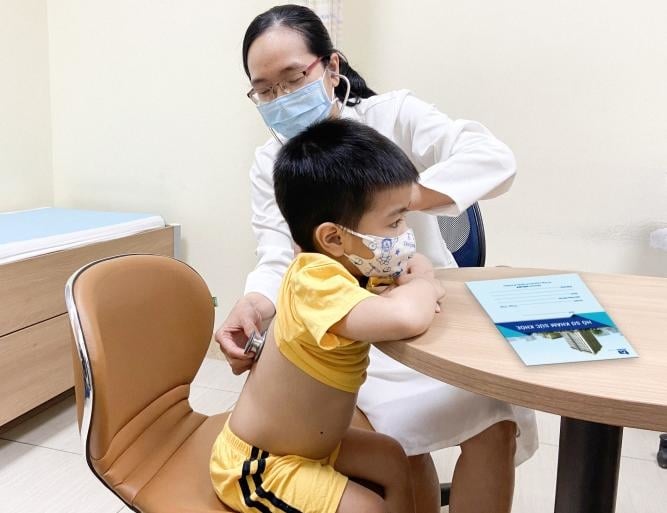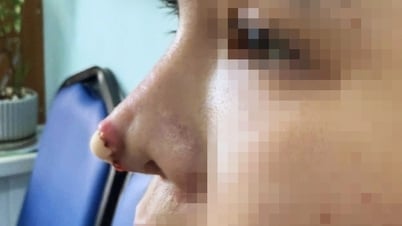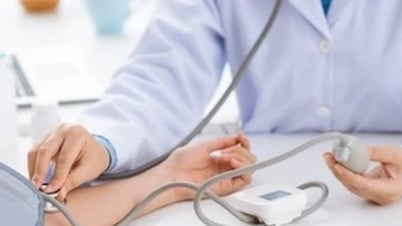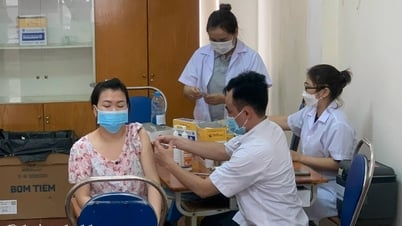The rate of children suffering from respiratory diseases and requiring long-term hospitalization is increasing due to the changing weather and erratic rain and sunshine.
In early June, Le Kien (6 years old, living in Phu Nhuan, Ho Chi Minh City) came to Tam Anh General Hospital in Ho Chi Minh City with a recurring fever for 6 days. Before that, he had been examined at another hospital and was diagnosed with pharyngitis but antibiotics did not help. He had a fever and pain in his left shoulder.
X-ray results showed that the baby had left lower lobe pneumonia. After 4 days of intravenous antibiotic treatment, the fever improved.
In another case, Nguyen Minh (11 years old) was taken to the emergency room by his mother due to difficulty breathing due to a severe asthma attack. Vo Thuy Phuong (36 years old, the child's mother) said that 2 days ago, after being caught in the rain, the child had a high fever, coughed up phlegm, and had a runny nose. At Tam Anh General Hospital, the child was given oxygen through a cannula and bronchodilator nebulizer. The child responded to treatment, with reduced coughing and wheezing.
Master, Doctor, Doctor Trinh Thi Hong Van, Department of Pediatrics, Tam Anh General Hospital, Ho Chi Minh City, said that recently, the rate of children suffering from respiratory diseases such as bronchitis, pneumonia, and asthma has increased not only in young children but also in older children (up 30% compared to 2 months ago). Many children have serious conditions and require long-term treatment.

Children with respiratory diseases come to the Pediatrics Department, Tam Anh General Hospital, Ho Chi Minh City. Photo: Tue Diem
Currently, the South is entering the rainy season, with many sudden showers interspersed with hot weather. The erratic weather increases the risk of respiratory irritation in children. This is also a favorable condition for viruses and bacteria to develop, easily transmitted through the respiratory tract causing bronchitis, bronchiolitis, pneumonia... Typical symptoms are cough, fever, runny nose, sore throat, wheezing.
Asthma is a common chronic respiratory disease that is easy to develop and relapse during the changing seasons due to increased risk of exposure to direct or indirect irritants. During the day, the patient develops a cough (increased phlegm secretion) and bronchial smooth muscle spasms, causing wheezing and difficulty breathing. If not treated promptly, the patient may die (sudden death).
According to the World Health Organization (WHO), the number of people with asthma is increasing. It is estimated that there are currently nearly 400 million people with asthma in the world.
In Vietnam, there are currently more than 4 million people with asthma, 2-6% of the general population and 8-10% of children with asthma, of which the age group of 12-13 has the highest rate in Asia with nearly 30% and is on the rise. Diagnosis and treatment of asthma in children is often late because the symptoms are sometimes unclear.
Doctor Van recommends that when the weather changes, parents should be more careful in taking care of their children; equip them with umbrellas and raincoats to avoid exposing them to cold rain; change clothes and keep them warm immediately after getting caught in the rain. Children are on summer vacation, however, parents should not let their children play too much in the unpredictable weather.
Children need to have a nutritious diet, eat cooked food, drink boiled water and live in a clean, fresh environment; the sleeping environment should not be too cold or too hot; and get all vaccines on schedule to increase children's resistance.
In case children travel with their families during the summer holidays, they need to be careful of respiratory diseases and prepare clothes suitable for each region. In addition, children need to prevent other diseases such as: hand - foot - mouth disease, dengue fever, skin diseases, eye diseases, digestive diseases...
When children have symptoms of cough, fever, runny nose, wheezing, difficulty breathing... they need to be taken to the hospital for early treatment.
Love
Source link



![[Photo] Top players gather at the 2025 Nhan Dan Newspaper National Table Tennis Championship](https://vphoto.vietnam.vn/thumb/1200x675/vietnam/resource/IMAGE/2025/5/23/9ad5f6f4faf146b08335e5c446edb107)

































































































Comment (0)